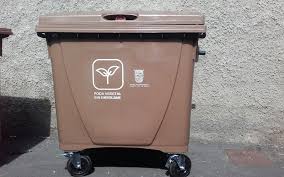I noticed a new bin at my local recycling station a couple of weeks ago. It’s big, it’s brown and it’s full after only two days.

The local council started a new initiative to collect “gardening rubbish”. It’s meant for big green things such as trees you cut back or the bush at the end of the garden that you finally removed or the remains of the big hedge which were cut off the plant to make it look like an over sized poodle.
I don’t have a garden, so I won’t need the new bin. Still, I’m all in favour of giving the neighbourhood the option to get rid of their foliage easily. As it turns out, the rest waste bin is no longer overflowing which is enough benefit for me.
Personally, I reuse, recycle, compost and make use of whatever waste management facility is on offer. I do it because it’s super easy, it reduces my local authority bills and it makes me feel like I do my bit for a better world.
Every country I ever lived in has it’s own way of dealing with rubbish and recycling and it generally doesn’t take too long to get your head around. In London, UK, every household has a waste collection bin with recycling stations within a reasonable walking distance. In rural Austria, every household has their own waste, paper and compost bins. In Switzerland, you can buy specific rubbish bags from dedicated shops or drop off your stuff at the recycling point just outside of town. In some parts of Spain, households don’t have their own bins and communal household waste bins are part of the recycling stations which are never far from home.
Sweden even imports waste from other countries to turn it into energy – and into profits – through incineration. The reason given is that the Swedish population recycles too much waste so that the governmental incineration stations receive insufficient waste for the incineration process to generate the required energy.
Over to you. What are you doing to and with your waste? Are you avoiding waste all together? Are you taking the easy way and put everything into one bin? Are you an ardent recycling supporter?
The reason I am asking is the fact that many people don’t think about this question. Many people are not aware of the full waste management offering from their community, village, city. Often, the first encounter with waste management arrive through the post in form of a pamphlet from the local council when there is a change to the current rules.
So, let’s look at the available options one by one, how practical they are and their pros and cons.
First off, illegal dumping, better known as fly-tipping, is never an acceptable option. It’s in the name: it’s illegal in many countries. The United Nations Environment Programme (UNEP) even includes it in it’s list of environmental crimes. Littering falls into the same category for me and more on this topic in a few weeks. The main issue with illegal dumping is the possibility of toxic waste which may be part of the dumped items. In order to get on top of the issue, many different actions are taken. One research paper even studied the use of GPS tagged sea gulls in locating illegal dumps containing organic material.
Second option, avoiding waste is a big topic around the globe and in simple terms it means to not buy things that will turn into waste e.g. plastic bottles, single use shopping bags. The US Environmental Protection Agency has a comprehensive list of tips for pretty much all situations. I do have my set of cotton shopping bags and tend to take them with me if I plan to go shopping. My gripes is with the times, when I remember to run an errand without planning ahead.
Third possible action on dealing with waste, if you do end up with that extra water bottle or single use plastic bag, you could try and re-use it. In my opinion, it is a good option if you are creative and have some time on your hand. It works particularly well if you have children who use that plastic bottle for a school project or you want set up a space saving garden at home.
The next possible action you can take is to recycle. Recycling has many benefits as proponents are always eager to point out. For example the Prestige Recycling Center points out that raw aluminium is twice as costly as recycled aluminium, it creates jobs and areas used for landfill can be utilised differently. However, not everything that glitters is gold (which can be recycled from laptops) and recycling has drawbacks which makes for an interesting debate on the topic.
Last but not least, you could do absolutely nothing and put everything in one bin. Given the above data, this seems a viable option even if it feels counterintuitive at first. Over time, technology will improve and develop and take care of the problem. In the meantime, binning everything helps countries such as Sweden who earns approx 800 million Swedish Krona (which is approx Euro 780; 90 million USD) per year with your waste.
Looking back over the options, what do you think now? Will you change your “rubbish ways”? Or will you continue as you do now? Ultimately, all that matters is that you are aware of what you do and the reason why you do it.
Personally, I encourage you to get on the bandwagon and reduce, reuse and recycle as much as you practically can. There’s every reason to continue and very little reason against it. It doesn’t cost money or time and you may even save you money. It’s good for your conscious and for mankind as a whole. Let’s keep this world clean together.
